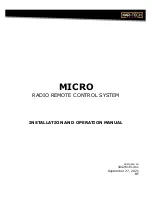
PRO SERIES
PS-1030
•
PS-1430
•
PS-1930
20
21
MAINTENANCE & TROUBLESHOOTING MANUAL
PS5.0-M REV B
SECTION 4
TECHNICAL REFERENCES
SECTION 4
TECHNICAL REFERENCES
4.3 | CONTROL BOARD DIAGNOSTIC
When using the LED for diagnosis, note that a
DUAL FLASH code is indicated. The LED will flash
on/off a certain number of times, pause off for
a short delay, then flash on/off a second certain
number of times, followed by a much longer
pause off. The sequence will then repeat.
EXAMPLE:
The LED flash code 3-2 will look like:
on/off/on/off/on/off-short-delay/on/off/on/off-
long-delay/repeat
FIGURE 6: LED Light Diagnostic Location
LED Code Possible Cause
Fast Flash Control Module is not calibrated, Do not operate unit.
Steady
Unit has just been powered on. You may need to wait for initialization, then re-select function.
Ready to operate, things should be working normally.
A function is selected but the enable trigger is not squeezed.
1-1
The control module is not calibrated. Do not use this unit.
2-1
The key switch selector switch indicate the mode in which the TS100 must operate. If neither
input is active, or if both are active together, the TS100 does not know how to function.
Check key switch and wiring to P15-1 and P12-1.
2-2
A safety feature is locking functions or a switch has failed.
Check that platform is not overloaded, operating on a level surface, and pothole guards deploy.
Check that joystick is neutral when powered on.
Check that joystick trigger is not closed for too long without selecting a function.
Check for failed joystick, selector switches, and up/down switches.
3-x
There is a problem with the drive contactor or valve wiring, or with the motor power wiring;
disconnect connector P9 to see if the problem is caused by drive contactor or valve wiring (if
the fault clears, check for an illegal B+ supply in to P9)
Check motor power wiring; with the drive contactor open the B+ power terminals should be at
10V-15V (significantly lower than B+) If the LED is steady at power-on, and the fault (3-5) occurs
after a delay when attempting to drive or lift, the motor may be stalled and causing an overload
of the TS100 or there is a power wiring error like connecting the B+ cable to a motor stud
LED Code Possible Cause
3-2
Check P9 wiring. One or more signals showing outputs when all should be off.
3-3
Check B+ stud connections on controller. Voltage is too high.
3-4
There is voltage on safe pre-valve supply when there should not be.
Controller may need to be replaced.
3-5
The drive brake current is too high.
Motor overload. Check for a seized motor or for power wiring to motors.
4-x
There is a problem with battery supply, the height and/or pressure sensors, the supply to them,
or the temperature sensor inside the TS100
Check battery supply to EMS inputs P15-1 or P12-1 (relative to the B- stud); the battery supply
should be between 15V and 32V
Check the output from height sensor (P12-12)
4-2
Functions Locked: Board is overheated. Check pump, drive motor wiring.
Problem with controller internal voltage. Controller may need to be replaced.
4-3
Problem with controller internal voltage. Controller may need to be replaced.
4-4
Battery supply is too low or too high.
Make sure batteries are fully charged.
Do not operate while charging.
4-5
Joystick signal problem.
Wiring problem-check for short circuits, misconnection, check P15-12 connection.
6-x
There is a problem with the height measurements, or the elevation switch disagrees with the
height sensor.
Check that the output from height sensor (P12-12) is in range (between 0.5V and 4.5V)
6-1
Problem with angle sensor or its connections
6-2
Problem with pressure sensor or its connections
6-3
Problem with elevation switch or its connections
6-6
Problem with CANbus wiring and/or connections
7-x
There is a problem with the power wiring – the voltage on the B+ stud is too low
Check for a short-circuit to the B+ stud
7-1
Motor A current too high.
7-2
Motor A current too low.
7-3
Motor B current too high.
7-4
Motor B current too low.
7-5
Check drive connections at both drives--short or multiple wiring faults.
7-7
Check B+ stud connections on controller. Voltage is too low.
FIGURE 7: EZ Cal Handheld Controller
If a handheld controller (Part no: ELEC-646-5)
is available, it will display error codes and their
description











































